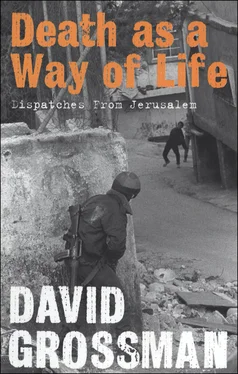David Grossman - Death as a Way of Life
Здесь есть возможность читать онлайн «David Grossman - Death as a Way of Life» весь текст электронной книги совершенно бесплатно (целиком полную версию без сокращений). В некоторых случаях можно слушать аудио, скачать через торрент в формате fb2 и присутствует краткое содержание. Год выпуска: 2013, Издательство: Bloomsbury Publishing, Жанр: Прочая документальная литература, на английском языке. Описание произведения, (предисловие) а так же отзывы посетителей доступны на портале библиотеки ЛибКат.
- Название:Death as a Way of Life
- Автор:
- Издательство:Bloomsbury Publishing
- Жанр:
- Год:2013
- ISBN:нет данных
- Рейтинг книги:5 / 5. Голосов: 1
-
Избранное:Добавить в избранное
- Отзывы:
-
Ваша оценка:
- 100
- 1
- 2
- 3
- 4
- 5
Death as a Way of Life: краткое содержание, описание и аннотация
Предлагаем к чтению аннотацию, описание, краткое содержание или предисловие (зависит от того, что написал сам автор книги «Death as a Way of Life»). Если вы не нашли необходимую информацию о книге — напишите в комментариях, мы постараемся отыскать её.
Death as a Way of Life — читать онлайн бесплатно полную книгу (весь текст) целиком
Ниже представлен текст книги, разбитый по страницам. Система сохранения места последней прочитанной страницы, позволяет с удобством читать онлайн бесплатно книгу «Death as a Way of Life», без необходимости каждый раз заново искать на чём Вы остановились. Поставьте закладку, и сможете в любой момент перейти на страницу, на которой закончили чтение.
Интервал:
Закладка:
The constant clashes between Israel and the Palestinians have impelled us more than once to dig ourselves into positions that are clearly very difficult to defend — such as our eighteen-year sojourn in Lebanon. In the end, we are forced to abandon those positions, by the skin of our teeth, after painful bloodletting.
For that reason, this is the time to ask again, as if for the first time, whether the statement “We won the Six-Day War” really requires reaching the conclusion that “we will therefore remain here forever, in the midst of a conquered people.” Is this really the only way to take advantage of the great Israeli victory in that war?
For years the peace camp has been mumbling about the necessity to evacuate the settlements. Mumbling, not yelling out loud, both because it recoils at the idea of uprooting families, children who were born there, and because of the fear that such an act will create a national trauma. But we can no longer continue to mumble. Logic requires the uprooting of many settlements that cannot be defended and whose existence will destroy the all-too-fragile chance for peace. Supporters of peace must make this mental switch to the end. The events of the last month, even if they elicit fear and doubt, in fact support such a step, and reveal the great danger inherent in lacking the courage to take this decision.
An Invitation to Dialogue: Response to a Palestinian Open Letter
November 2000
In early November 2000, Palestinian intellectuals published in the major Israeli newspapers an urgent statement. They offered several basic principles that should be fulfilled in order to renew the peace process and end the violence: namely, an end to the Israeli occupation, acceptance of Jerusalem as the capital of both states, and Israeli recognition of its responsibility for the creation of the Palestinian refugee problem. “Peace and co-existence will not be accomplished by imposing an unjust settlement that goes against the will of the people. This land is destined to be the home of our two peoples … It is our hope that, out of the tragedies of recent weeks, a new and fair vision of peace can emerge between the two peoples.”
The author’s reply to the Palestinian appeal was published in Arabic in the Palestinian newspaper al-Ayyam on November 18, 2000.
Sirs and Madams,
A week ago, 121 Palestinian academics and public activists published an open letter to the Israeli public. As a member of that public, I would like to respond.
Before I address the substance of what you wrote, I would like to state that the publication of a letter in the Israeli press is of great importance. In these times, each side is hearing only gunshots and belligerent rhetoric, and many have despaired of any rational dialogue. So I would like to thank you for having opened the door to a conversation of a different type, without which we will not reach a solution.
As an Israeli who seeks peace, I agree with no small number of the positions presented in your appeal. This applies both to your description of the harsh reality that prevailed in the occupied territories under the façade of the Oslo Accords and to the pointlessness of a peace agreement that reflects, more than anything else, Israel’s military superiority. Similarly, most of the “broad principles” you proposed seem to me to be a possible basis for a future agreement.
However, as an Israeli who seeks peace, what I find missing from your open letter is a statement that such an agreement will constitute the end of all claims on both sides, and that it will contain a recognition of the 1967 borders as the permanent borders between Israel and Palestine. I would have hoped to see such a letter more clearly address the future relations between the two states, a joint war on terror, and a joint campaign against incitement, without which future generations will grow up infected with hatred and racism.
I do not pretend to represent anyone else, but it seems to me that I am not alone in my opinions. A growing number of Israelis recognize that a peace agreement must lead to the establishment of a sovereign and independent Palestinian state. To achieve this, Israel must retreat from almost all the territories it occupied in 1967, evacuating most of the settlements, with consensual border rectifications based on an exchange of territory. Israel’s cabinet includes ministers who speak of dividing Jerusalem and turning it into two capitals for the two peoples, together with a compromise on sovereignty over the holy sites. Generous Israeli ideas about the refugee problem are also being proposed today, with the goal of resolving this issue.
I am not trying to claim that these are the opinions of the Israeli majority, but it is also clear to me that they are not those of an insignificant minority.
And that is not something to be taken lightly. The Israeli public now feels threatened, for several reasons. Most Israelis were not at all aware of the depth of Palestinian rage over the way the peace process was conducted. They were taken by surprise by the violence that was directed against them. They had believed that the peace process had brought with it a road map toward reconciliation. Most of the Jewish public in Israel (like most of the Palestinian public) was not familiar with the details of the agreement. Israelis felt that they had already made huge concessions, that they had overcome their anxieties and traumas. And here, right at the finish line, as they saw it, their partners in the process betrayed them, violated a signed agreement, and who knew what more those Palestinians would demand, once they had “received” their independent state.
I am familiar with the Palestinian responses to these claims. I agree with some of them. Yes, the Israelis don’t honor agreements. And the Israeli military presence in the occupied territories is violent. There are also the settlements, the areas sealed by the army, and the siege. As well as the brutal military response against stone throwing.
I write these lines and feel the depressing futility of repeating arguments that are so familiar to all of us. What is the point of beating round the bush along the familiar path of recrimination, when hundreds of innocent people, Palestinians and Israelis, are being killed? What is the point, in the current situation, of trying to determine who is guilty or who started it all? All of us, Israelis and Palestinians, are participants, to one extent or another, in the tragedy that has come upon us. But there’s one thing that can’t be doubted despite all this fear and confusion: If the leadership on both sides is not truly courageous, Jewish and Palestinian children will continue to kill each other, and we, their parents, will send them to die (and we’ll then charge each other with “making use of children”).
The al-Aksa Intifada has, with great force, brought Palestinian pain, humiliation, and anger to the surface. The entire world and, within it, many Israelis also now understand that the Oslo agreements must be reopened and that a new peace agreement, a fairer and bold one, must be drafted. Such an agreement will present difficult challenges to both peoples, perhaps too difficult to bear. Both sides will have to give up concrete and important assets. Both will also have to give up the delusions and illusions that have accounted for their strength and hope and national consciousness.
Every rational person understands that continuing violence, on both sides, is liable to send the region into disaster, into a historical tragedy whose outcome no one can now predict. Neither Israelis nor Palestinians will come out of it well. Maybe only the extremists among both peoples want it. They, in the final analysis, are the true enemies of the majority on both sides.
Читать дальшеИнтервал:
Закладка:
Похожие книги на «Death as a Way of Life»
Представляем Вашему вниманию похожие книги на «Death as a Way of Life» списком для выбора. Мы отобрали схожую по названию и смыслу литературу в надежде предоставить читателям больше вариантов отыскать новые, интересные, ещё непрочитанные произведения.
Обсуждение, отзывы о книге «Death as a Way of Life» и просто собственные мнения читателей. Оставьте ваши комментарии, напишите, что Вы думаете о произведении, его смысле или главных героях. Укажите что конкретно понравилось, а что нет, и почему Вы так считаете.












